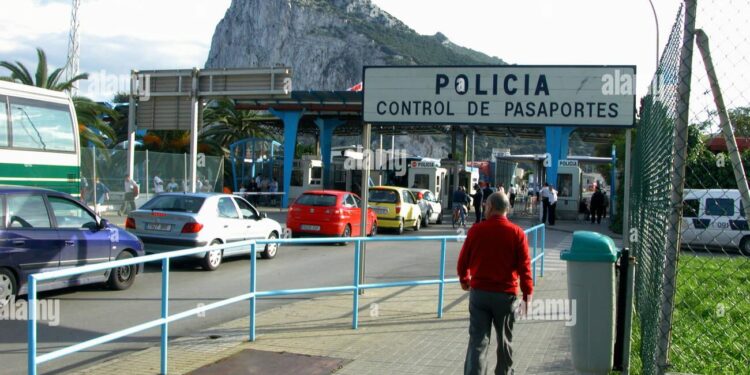In a significant development marking the final stages of the United Kingdom’s departure from the European Union, the recently agreed Gibraltar-Spain border deal has emerged as a crucial component in resolving long-standing cross-border complexities. This landmark agreement, hailed by many as the last piece of the EU exit jigsaw, seeks to balance sovereignty concerns with the practicalities of daily life on the peninsula. As both sides navigate the delicate political and economic ramifications, the deal promises to redefine Gibraltar’s status and its relationship with the EU, offering new clarity amidst years of uncertainty sparked by Brexit.
Gibraltar-Spain Border Deal Marks Critical Turning Point in Post-Brexit Relations
The recent agreement between Gibraltar and Spain signifies a landmark development in the complex tapestry of post-Brexit negotiations. After months of tense diplomacy, both parties have found common ground to ensure the fluidity of border traffic, security cooperation, and trade facilitation. This new understanding not only alleviates the fears of a hard border but also reinforces Gibraltar’s unique status while acknowledging Spain’s legitimate interests. The deal includes provisions for joint customs checks and streamlined cross-border movement, creating a framework aimed at reducing the daily disruptions experienced by commuters and businesses alike.
Key components of the agreement include:
- Implementation of a special mobility zone allowing eased access for Spanish workers
- Establishment of joint customs posts to monitor goods without hindering passenger flow
- Enhanced collaboration on law enforcement to tackle smuggling and other cross-border crimes
- Commitment to ongoing dialogue ensuring the flexibility of the arrangement amid changing political landscapes
| Aspect | Before the Deal | After the Deal |
|---|---|---|
| Border Checks | Lengthy customs and immigration delays | Joint checks, reduced hold-ups |
| Trade Flow | Uncertain and sporadic disruptions | Consistent and regulated procedures |
| Security Cooperation | Limited coordination | Integrated law enforcement efforts |
| Worker Movement | Restricted and complex paperwork | Simplified access for cross-border commuters |
Navigating Sovereignty and Security Challenges in the Implemented Agreement
The agreement reached between Gibraltar and Spain marks a significant stride in addressing the delicate balance between sovereignty and security. Both parties had to make concessions to ensure Gibraltar’s continued economic vitality while respecting Spain’s territorial claims. Sovereignty concerns remain deeply sensitive, underpinning much of the negotiation dynamics, yet the deal reflects a pragmatic approach to avoid the friction that might otherwise have escalated post-Brexit. Security collaboration mechanisms have been enhanced to safeguard against illicit activities, with both sides committing to a shared framework that aligns with broader EU and UK interests, thereby reducing the risk of border disruptions or illegal crossings.
At the heart of the implemented arrangement lies an intricate system designed to facilitate fluid border management while protecting national interests. Key features include:
- Joint Customs Controls: Allowing coordinated checks to streamline trade flow and minimize queues;
- Data Sharing Protocols: Enhancing cross-border intelligence to tackle smuggling and trafficking effectively;
- Legal Harmonization: Aligning certain regulations to avoid jurisdictional conflicts;
- Dispute Resolution Mechanisms: Providing clear channels to address unforeseen sovereignty issues swiftly.
| Challenge | Approach Taken | Impact |
|---|---|---|
| Sovereignty | Mutual recognition with limits | Reduced tension, preserved status quo |
| Security | Joint patrols and intelligence exchange | Enhanced border integrity |
| Trade Facilitation | Coordinated customs procedures | Smoother cross-border commerce |
Strategic Recommendations for Ensuring Smooth Cross-Border Cooperation Moving Forward
To foster a sustainable and frictionless environment along the Gibraltar-Spain border, authorities must prioritize transparency and open communication channels. Establishing a bilateral oversight committee composed of both Spanish and Gibraltarian representatives can monitor the implementation of the deal, address emerging challenges promptly, and coordinate responses to unforeseen disruptions. Furthermore, leveraging digital technologies for real-time data sharing on customs, immigration, and trade flows will reduce bureaucratic delays and build mutual trust.
Equally crucial is the focus on community engagement and cross-border economic collaboration. Investing in joint infrastructure projects, such as enhanced transport links and shared public services, could stimulate growth and reassure local populations of the benefits arising from cooperation. The table below summarizes the core strategic pillars to maintain momentum in the post-deal phase:
| Strategic Pillar | Key Actions | Expected Outcomes |
|---|---|---|
| Governance | Establish Oversight Committee | Prompt conflict resolution |
| Technology | Implement Digital Data Exchange | Minimized border delays |
| Community | Facilitate Public Consultations | Enhanced social acceptance |
| Infrastructure | Develop Cross-Border Projects | Economic growth and connectivity |
Future Outlook
As the Gibraltar-Spain border deal takes shape, it marks a significant milestone in the complex aftermath of the UK’s departure from the European Union. While not closing all chapters of Brexit-related negotiations, this agreement addresses one of the most contentious frontiers, offering a framework for cooperation and stability in the region. Whether it truly represents the final piece of the EU exit jigsaw remains to be seen, but for now, it provides a cautious optimism for smoother cross-border relations and a step toward resolving long-standing tensions. Stakeholders on both sides will be watching closely as implementation unfolds, underscoring the delicate balance between sovereignty, diplomacy, and practical governance in a post-Brexit Europe.







![2 Days in Gibraltar, a British Overseas Territory [Activities, Hotels] – Upgraded Points](https://europ.info/wp-content/uploads/2026/02/3041513-2-days-in-gibraltar-a-british-overseas-territory-activities-hotels-upgraded-points-350x250.jpg)








